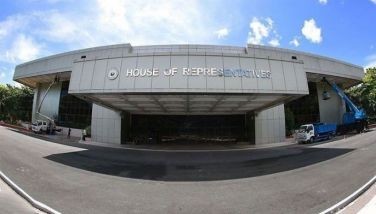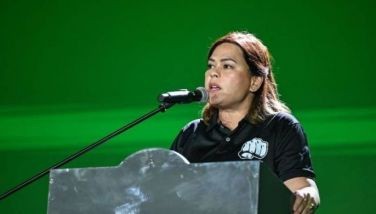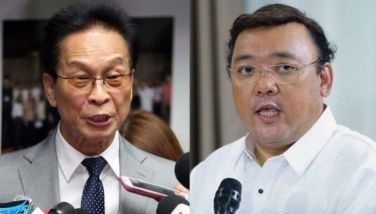Normalcy

October 5, 2001 | 12:00am
HONOLULU — Someone appealing that I cancel my trip to the United States asked me: What if there’s another attack? What if World War III broke out and I got stranded abroad? I’d leave a will, I said. And it’s a testament to these bizarre times that I found myself only half-joking. Traveling can be torture these days. From Manila to Hawaii it took me 22 hours, including a three-hour wait at the NAIA because of tight security checks at Northwest Airlines, plus a six-hour layover in Tokyo where carry-on baggage was also minutely scrutinized. An inspector at the NAIA painstakingly unwrapped several small gift-wrapped boxes, went over the contents then rewrapped everything.
Japanese visitors, one of the biggest sources of tourism revenues here, have shied away from Hawaii after the Sept. 11 terror attacks in New York and Washington. As of Sept. 24, Japanese arrivals were down 59 percent compared to the same period last year, according to The Honolulu Advertiser. The Japanese, it seems, were spooked by US President George W. Bush’s reference to Pearl Harbor after the Sept. 11 attacks. The Advertiser reported that with the sharp downturn in tourist arrivals, Honolulu has become one of the four US cities to suffer the worst economically in the wake of the attacks. The three others are Las Vegas, Orlando and Fort Worth in Bush’s home state. The downturn is expected to reduce this city’s Gross Municipal Product by around $500 million by the second quarter of 2002, the newspaper reported.
The Ilocano taxi driver who brought me to the East-West Center here said Filipinos have already lost jobs as a result of the downturn. There are 170,000 Filipinos in Hawaii, Philippine Consul General Rolando Gregorio told me, and he confirmed that a number of them have been affected. Gregorio, however, thinks the downturn is temporary. The association of major American airlines reported that last Sunday, for the first time since Sept. 11, flights across the United States were 68 percent full with 946,116 people putting their faith in air transportation. This was close to the September level last year, when an average of one million people boarded flights in the US.
This week the last US airport to remain closed in the aftermath of the attacks reopened. But I guess everyone is still keeping an eye out for carry-on knives and box cutters. There are canine bomb sniffers at the airport here. For a while security was so tight at the naval base at Pearl Harbor that even soldiers who were off duty were barred from the base, but security has since relaxed.
"We can’t let terrorists run our lives," Charles Morrison told me. Morrison is president of the East-West Center. He admitted that East-West briefly considered canceling our Fall 2001 Jefferson Fellowship. But they decided that unless the fellows themselves wanted the program scrapped, it would push through as scheduled, with a special change in the itinerary: a visit to New York instead of Houston, Texas.
None of us cancelled so maybe I’m not the only one who thought of leaving a will behind. For many people, every effort to return to normalcy, every flight taken despite fears, is a blow against terrorism. Instead of returning to life before the attacks, however, Americans may find themselves simply redefining normalcy. A TV report said Americans are suffering from post-traumatic stress. One of our speakers said they are still in shock.
Vietnamese-American Thanh-Lo Sananikone, who lived in Manila for several years, said her daughter is still traumatized after losing all but one of her officemates at the World Trade Center. The daughter has refused to return to her Manhattan home.
Interestingly, Morrison told me he saw parallels between America’s new war and the Manila government’s problem with suicidal Muslim juramentados who tried to drive away Christians (and then Americans) from Mindanao a century ago. Morrison did a study on Sulu when he was a student. How long did it take for the Philippines to deal with this problem? We may no longer see juramentados wrapped head to toe in white cloth after a purifying bath, swinging at their enemies with a kris. But there’s still Islamic unrest in Mindanao, with its vicious fundamentalist form embodied by the Abu Sayyaf. Can the cyberspace generation, used to instant gratification, wait that long for results? With so much uncertainty, with lives taken or spared so randomly, it’s better to just get on with life, Thanh-Lo said. Some of her loved ones have since flown to and from the mainland. She fears for their safety. She prays. But she doesn’t stop them from flying. It’s their way of fighting back.
Japanese visitors, one of the biggest sources of tourism revenues here, have shied away from Hawaii after the Sept. 11 terror attacks in New York and Washington. As of Sept. 24, Japanese arrivals were down 59 percent compared to the same period last year, according to The Honolulu Advertiser. The Japanese, it seems, were spooked by US President George W. Bush’s reference to Pearl Harbor after the Sept. 11 attacks. The Advertiser reported that with the sharp downturn in tourist arrivals, Honolulu has become one of the four US cities to suffer the worst economically in the wake of the attacks. The three others are Las Vegas, Orlando and Fort Worth in Bush’s home state. The downturn is expected to reduce this city’s Gross Municipal Product by around $500 million by the second quarter of 2002, the newspaper reported.
This week the last US airport to remain closed in the aftermath of the attacks reopened. But I guess everyone is still keeping an eye out for carry-on knives and box cutters. There are canine bomb sniffers at the airport here. For a while security was so tight at the naval base at Pearl Harbor that even soldiers who were off duty were barred from the base, but security has since relaxed.
"We can’t let terrorists run our lives," Charles Morrison told me. Morrison is president of the East-West Center. He admitted that East-West briefly considered canceling our Fall 2001 Jefferson Fellowship. But they decided that unless the fellows themselves wanted the program scrapped, it would push through as scheduled, with a special change in the itinerary: a visit to New York instead of Houston, Texas.
Vietnamese-American Thanh-Lo Sananikone, who lived in Manila for several years, said her daughter is still traumatized after losing all but one of her officemates at the World Trade Center. The daughter has refused to return to her Manhattan home.
Interestingly, Morrison told me he saw parallels between America’s new war and the Manila government’s problem with suicidal Muslim juramentados who tried to drive away Christians (and then Americans) from Mindanao a century ago. Morrison did a study on Sulu when he was a student. How long did it take for the Philippines to deal with this problem? We may no longer see juramentados wrapped head to toe in white cloth after a purifying bath, swinging at their enemies with a kris. But there’s still Islamic unrest in Mindanao, with its vicious fundamentalist form embodied by the Abu Sayyaf. Can the cyberspace generation, used to instant gratification, wait that long for results? With so much uncertainty, with lives taken or spared so randomly, it’s better to just get on with life, Thanh-Lo said. Some of her loved ones have since flown to and from the mainland. She fears for their safety. She prays. But she doesn’t stop them from flying. It’s their way of fighting back.
BrandSpace Articles
<
>
- Latest
- Trending
Trending
Latest
Recommended




























